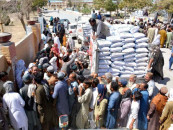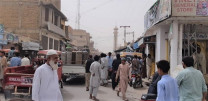Planting of 100m trees demanded along TAPI route
ESIA specialist says will submit report to Afghanistan and Pakistan in August 2018 to finalise route

Turkmenistan-Afghanistan-Pakistan-India (TAPI) Gas Pipeline. PHOTO: FILE
These views were expressed by participants of a scoping meeting organised by Environmental Management Consultants (EMC) as part of the Environment and Social Impact Assessment (ESIA) study being conducted for the proposed TAPI Gas Pipeline.
Work on TAPI pipeline begins in Pakistan
Addressing on the occasion, Balochistan Secretary Environment Saboor Kakar said, “TAPI will link the region. It will bring neighbouring countries closer as this will be one of the most important projects of central Asia.”
He said that securing the route of TAPI Gas Pipeline would be a huge challenge for the country and suggested the corridor of the pipeline be linked with other trade and communication corridors.
"Balochistan holds major share in the project. Population in the province is scattered which means that project will collide with very few structures in construction," Saboor Kakar said.
Pakistan, Turkmenistan agree on early completion of TAPI project
Taking over the podium, Environment Protection Agency Balochistan DG Tariq Zehri said, “TAPI pipeline is a positive sign of regional stability. In exchange for the gas pipeline, TAPI must plant at least 100 million trees on the route of gas pipeline as a gift for the people of Balochistan.”
Zehri said, "TAPI Gas Pipeline project will be a game changer like CPEC for Balochistan.”
EMC COO Asif Shuja said that 1,814km TAPI Gas Pipeline transports gas from Galkynsh Gas fields in Turkmenistan through Afghanistan into Pakistan and India. The TAPI project aims to export up to 33 billion cubic metres of gas annually for a period of 30 years, including 819 in Pakistan. A total of 400km pipeline will be constructed in Balochistan.”
TAPI pipeline: Pakistan to press for reducing gas import price
Shuja said, “The pipeline will enter through Pakistan-Afghanistan border in Chaman, Balochistan, which will end Pakistan-India border near Fazilka in Punjab. The route of the pipeline will include Chaman, Qilla Abdullah, Pishin, Ziarat, Loralai, and Musakhel."
He said the objectives during the construction of the pipeline are in compliance with the local and international laws, which requires environmental and social study to assess the possible positive and negative impacts.
"After scoping data collection surveys, impact analysis, mitigation measures, land acquisition and resettlement will be conducted. We have different teams working on different sectors, including data collection and environmental survey," the EMC COO said.
EMC Managing Director Saeed Nadeem Arif said, "As the TAPI project was conceived in 1990s by four countries Turkmenistan, Afghanistan, Pakistan and India, four separate ESIAs are being undertaken for the project by each country."
In his presentation, ESIA specialist Saqib Ejaz told the participants that scoping was a mandatory step in TAPI Gas Pipeline project.
TAPI hired international consultant companies and EMC was a local consultant of the company.
Turkmenistan completes its section of TAPI pipeline
"The construction corridor for the pipeline is 38m, while the pipeline route may require modifications,” Ejaz said.
He said that the ESIA would submit its report to Afghanistan and Pakistan in August 2018, after which the route would be finalised.
The scoping meeting’s main agenda was to identify sensitive areas. "We have to assess every sector as a drawback could cause $2.5 million per metre," said Ejaz.
"Balochistan will not be affected by the pipeline route as compared to Punjab due to its scattered population. Our aim is to minimise the displacement. According to assessment, only 20 structures will collide with the gas pipeline. The pipeline route will be diverted from Ziarat to save Jennifer Forest," said Ejaz.
He said that physical environment surveys will be conducted in 23 different areas, adding that locals will be part of surveys to get better outcome.



















COMMENTS
Comments are moderated and generally will be posted if they are on-topic and not abusive.
For more information, please see our Comments FAQ